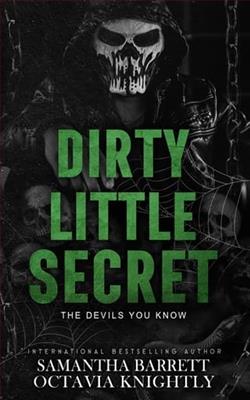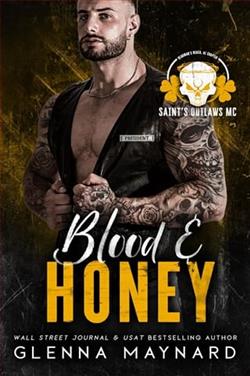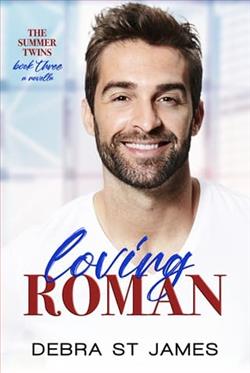Page 10 of Find Me in California
“Find my diary, Jules. The light-blue one with gold embossed lettering. You know the one. I need it.”
A sharp inhale from Liza. Julia spares the woman a glance. She has no idea what her grandmother is talking about. She’s never seen such a diary in her possession. She didn’t know her grandmother had kept diaries. But Liza’s complexion has gone ghostly white.
Trevor wheels Mama Rose from the room, and Liza stands with the assistance of a cane, collecting her book and readers. “All those secrets.”
“Excuse me?” Julia’s head swerves toward the woman.
“She was very good at keeping them.”
Shock immobilizes Julia. Did Liza just admit she’d known Mama Rose from before?
“What do you mean by that?” Julia asks. “What secrets?”
“That’s not a question for me.”
But Julia can’t ask her grandmother. Mama Rose has likely already forgotten she wants the diary.
“What do you know of her diary?” Julia asks. Now she must find it.
Liza’s thin, faint brows bob once before she leaves the room, stunningly quick for her age.
CHAPTER 5
MATT
Seated at his desk in his office, Matt can’t focus. He thought dinner and an old-fashioned would put him in the right mood to work on the RAW images. He’s on deadline. But he’s irritable and distracted. His mind keeps drifting to Elizabeth. He never thought she’d end up destitute and alone. How did she manage that?
From what Matt knows of his mom’s side of the family, which he only learned of in sound bites from Adam, Elizabeth’s butler, they had been wealthy. His great-grandfather started in the movie business as a cameraman in the 1930s and worked his way up to producing films. Elizabeth inherited the house in Beverly Hills when he passed. Her mother, Matt’s great-grandmother, died in the fifties. Elizabeth was raised on movie sets and back lots and often regaled friends and acquaintances with stories of Gary Cooper and Rock Hudson. Her garden parties had been legendary. Matt witnessed many of them from his bedroom window, which overlooked the sprawling backyard. She was married to Matthew Holloway, a 1960s heartthrob and actor, for a short time. They had one daughter, Aubrey, Matt’s mom. She was born in 1973 and quickly followed in her father’s footsteps, starring in movies until she turned seventeen, when she met Matt’s dad and left the industry.
Matt avoids thinking about his mom. He can’t remember her without remembering how she died. He can’t even bring himself to watch the movies she starred in. He also doesn’t go out of his way to think about his dad, because it always makes him think of his mom. In turn, he barely remembers what his parents look like when he closes his eyes.
Estranged from their families, Matt’s parents seldom spoke about their childhoods or how they met. Matt was quite young when his parents died, so he doesn’t remember hearing much about his relatives other than generic highlights. Which only makes him think how little he does know of his parents. He had only ten years with them.
He then had eight drawn-out years with his grandmother, the reluctant guardian. The woman who blamed him for her only daughter’s death, completely disregarding Matt’s feelings on the matter. Completely ignoring that he was devastated, grieving, and had PTSD. He couldn’t talk about what had happened. Elizabeth took his silence as a personal affront and, other than advising her butler, Adam, to watch over him, left Matt to his own devices.
So why would she appoint him as her secondary power of attorney? Surely there must be someone more suitable. What will happen to her if he doesn’t step up? Will the government intervene? His knowledge is limited, but he assumes she’ll become a ward of the state. She’ll be assigned a guardian, who’ll move her to a state-run facility. She’ll be fine. Won’t she?
Unless she’s psychologically and physically sound and doesn’t need a guardian. She’s just broke.
Would Rosemont unload her at a nearby motel? Would they give her a one-way bus ticket to a destination of her choice like a prisoner who’s served their term?
He doesn’t like how that makes him feel: guilty, neglectful, and regretful. Because he could do something. Heshoulddo something.
Elizabeth didn’t take him under her wing by any means, but she did allow him to stay under her roof.
Damn moral compass.
Matt shoves away from his desk and rolls his chair to the center of the room. Leaning back, he stares at the ceiling fan overhead, drumming a pen on his thigh. Dave was right. Elizabeth is messing with his head.
He drags his hands down his face and sits upright. “What would you do?” he asks of the woman in the photo on his desk. In the picture he stands between his parents on his dad’s charter boat,Key to My Heart. Matt was nine when the photo was taken. It’s the only picture he has of his parents. Their neighbor, a Mrs. Kinsley, had the good sense to pack it in his luggage when she put him on a plane to California.
Aubrey Gatlin was one of the most generous souls Matt had known. Even at ten, he understood his mom was different from others, a childhood star who abandoned Hollywood’s glitz and glam for a more private and emotionally rewarding life, a life she really wanted. She collected used shoes and books for students in schools in lower-income districts. She invited neighbors who didn’t have family over for the holidays. One fall, she volunteered at the homeless shelter and brought home a woman and her son to stay in their guest room through the New Year.
His dad often said his mom’s heart was the key to their love, that it was too big to break. He didn’t live long enough to witness her heart shatter.
It confounded Matt how someone as warm and giving as his mother could come from a cold, insensitive woman like Elizabeth. Would Aubrey look past their estrangement to help her mom if Elizabeth needed her?
“You would, wouldn’t you?”















